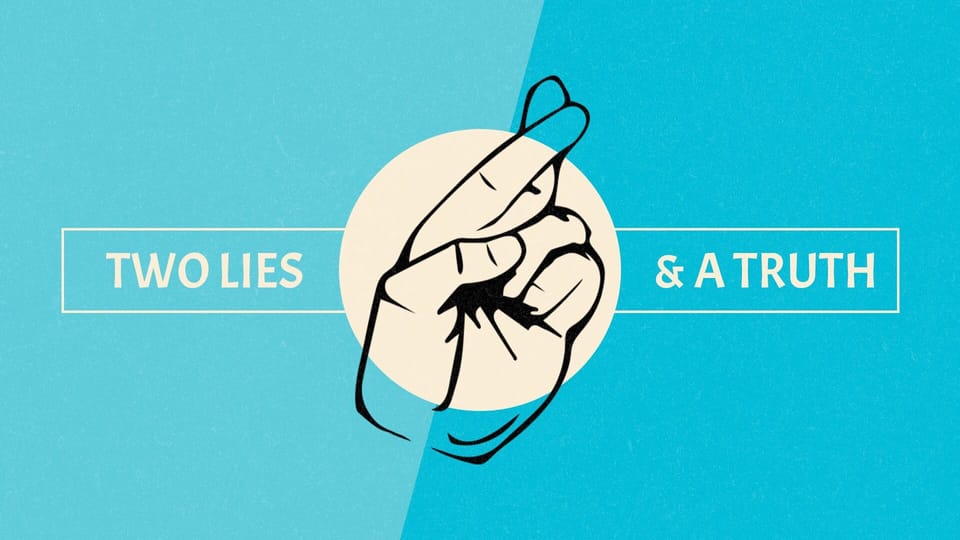Two Lies and a Truth About Sex

Big Idea: Sex isn’t everything and it’s not nothing. It’s a gift that points to an even greater gift.
There should have been a sign outside. “Warning: the pastor is going to talk about sex.” Could there be any more incendiary topic? It’s a topic that is on everybody’s mind. It’s a topic that is powerful, that touches the core of who we are. God made us to be sexual beings. And yet it’s a topic that’s fraught with powerful, conflicting emotions. It’s also a topic about which we’re bombarded with messages every day, messages that conflict and that can easily overwhelm and confuse us.
So I want to congratulate you on being here today. We’re going to approach this topic with care. My goal is to look, as carefully and clearly as we can, at two lies that we often hear about sex. Just to be clear, I think that sometimes the church has been guilty of perpetuating some of these lies. And then I want to look at the truth that the Bible teaches us about sex.
My goal in this sermon is to help us all take a step away from destructive lies on this topic toward God’s liberating truth on this topic, so that we can live in greater freedom.
Two Lies
Okay, here are the two lies that we’re tempted to believe about sex. We hear these messages every single day.
Lie #1: Sex is everything.
This is the belief that our sexuality is really the most important thing about us, and that freely satisfying our sexual desires is essential.
Margaret Sanger writes:
Sexual liberation is the only method to finding inner peace and security and beauty. Remove the constraints and prohibitions, which now hinder the release of inner energies and, most of the larger evils of society will perish. Through sex, mankind will attain the great spiritual illumination, which will transform the world and light up the only path to an earthly paradise.
That sounds a little over the top, but we hear versions of this all the time:
- The worst thing you can do is to try to restrict somebody’s sexual expression.
- It’s dangerous and unhealthy for somebody to not be able to express their sexual desires.
- There’s no such thing as wrong sexual expressions, as long as everybody is willing.
- It’s essential for you to be able to both define yourself and express your sexual desires if you want to be healthy.
- To question someone’s attractions and preferences is to question their personhood and dehumanize them.
We hear all those messages and more.
I want to pause here for a minute and say that, although this lie is expressed differently today, it’s not really new. I’m reading through Deuteronomy right now, and one issue that it covers is that God’s people are to avoid the practices — including the sexual practices — of the surrounding nations. Mark Clark writes:
The Bible was written to people living in cultures of extreme sexual perversion wherein people regularly engaged in premarital sex, extramarital sex, sexual slavery, temple prostitution, orgies, homosexuality, and various forms of promiscuity. Sex-is-god thinking was as normal in the first century as it is today. The form and accessibility of these things, however, has evolved, of course.
Today we live in a world that’s shaped by the sexual revolution of the 1960s, as well as Internet pornography, birth control, abortion, and the growing acceptance of alternate lifestyles. So although this view isn’t new, its expression is a little different today.
I mentioned there’s also a Christian version of this lie that sex is everything. This is the message that if you’ve failed sexually that you’ve ruined yourself. It treats sexual failure as catastrophic. Some wanted to take God’s commands seriously on sex, but as Dean Inserra writes, “What began as a good and worthy endeavor inadvertently produced Pharisees on one side of the True Love Waits card and people desperately grasping for fig leaves on the other.” Or as Katelyn Beatty wrote in the New York Times, “Rather than emphasize the gift of sex within marriage, purity culture typically led with the shame of having sex outside of it.”
What is the problem with this view? It’s simple. It makes way too much of sex. Sex is important, but it’s not ultimate. You are more than your sexual desires, activity, or mistakes. It’s dangerous to pin too much of our identity on our sex.
There are a number of lines of argument I could use from Scripture — Scriptural commands that govern our sexuality, the temporary nature of our sexual expression, the celibacy of Jesus, for instance — but let me just highlight one.
In Genesis 1 we read:
Then God said, “Let us make man in our image, after our likeness. And let them have dominion over the fish of the sea and over the birds of the heavens and over the livestock and over all the earth and over every creeping thing that creeps on the earth.”
So God created man in his own image,
in the image of God he created him;
male and female he created them.
(Genesis 1:26–27)
This is such an important passage for understanding who humans are. According to Bible, we are made in the image of God as the pinnacle of his creative work here on earth. We were made as God’s regents here on earth, ruling over creation on his behalf. A key part of that is our sexuality and gender, but that is only part of what it means to be human. We are so much more than just our sexuality. Our identity doesn’t come from our sexuality but from who God says we are. Ultimately, if you are a follower of Jesus, your identity comes from him.
Trevin Wax writes:
…the church must say, “Human dignity means you are not defined by your sexual attraction.” Staking your identity in sexuality or pinning your hopes for happiness on sex is too low of a goal for a human being made in God’s image…
One does not need a sexual relationship in order to be a full and flourishing human being. Just look at Jesus. Or the dozens of leaders throughout church history who never married…
“You are so much more than your sexuality.” We will not reduce our human self-understanding and self-expression to sexual urges.
You are far more than your sexuality.
Here’s the other lie that culture tells us, though. On one hand, it says that sex is everything.
Lie #2: Sex is nothing.
It’s funny. On one hand, culture tells us that sex is everything, that it’s core to who we are, and that we must build an identity around it. On the other hand, it tells us that sex is nothing, that it’s just a harmless activity that we do that means nothing. When you get hungry, you eat. When you feel a sexual desire, you satisfy it. It’s just an appetite and nothing more. There’s nothing moral or immoral about it. Hooking up is nothing at all.
Again, this is not a new view. Earlier this year we studied Paul’s first letter to the Corinthians. In 1 Corinthians 6:13, he quotes a slogan that some people seemed to believe in Corinth: “Food is meant for the stomach and the stomach for food.” In the context of chapter 6, he’s talking about sex. This statement is exactly what we’ve been talking about: that your physical appetites are meant to be satisfied. Paul counters this belief: “The body is not meant for sexual immorality, but for the Lord, and the Lord for the body” (6:13).
Here’s what Paul is saying: God owns your body. Your body matters to him. You’re not free to do whatever you want with it, because your body belongs to the Lord. Sex is not nothing because our body really matters to God.
This is completely different from what we’re taught to believe: that we belong to ourselves and can choose however we want to live. Paul tells us the opposite: you don’t belong to yourself. “You are not your own, for you were bought with a price. So glorify God in your body” (1 Corinthians 6:19-20).
So there are the two lies that culture tells us about sex. What’s the truth that Scripture teaches us?
Truth: Sex is a gift that points to an even greater gift.
Let’s break this down.
First: sex is a gift. The Bible is very sex-positive. Listen to just one example
Let your fountain be blessed,
and rejoice in the wife of your youth,
a lovely deer, a graceful doe.
Let her breasts fill you at all times with delight;
be intoxicated always in her love.
(Proverbs 5:18–19)
As one commentator (Ray Ortlund) observes, this passage “emphasizes two things: the quality of lovemaking (“fill . . . with delight” and “be intoxicated”) and the quantity of lovemaking (“at all times” and “always”). The wisdom of God is saying, ‘When you get married, drop your inhibitions, and go for it.’”
And that’s just one example! Sexuality is such a gift that it’s to be protected as part of a whole-life commitment between husband and wife, but within that marriage, it’s meant to be enjoyed to the point of being intoxicated, in a manner of speaking, but your love.
Again, to quote Ray Ortlund, sex is like a fire. “Outside the fireplace, it burns the house down. Here’s the message of the Bible: ‘Keep the fire within the marital fireplace, and stoke that fire as hot as you can.’”
So sex is a gift. But here’s the next part.
It’s a gift that’s a pointer to an even greater gift.
Ephesians 5:31-32 quotes Genesis 2, from when God created marriage: “Therefore a man shall leave his father and mother and hold fast to his wife, and the two shall become one flesh.” It then adds this surprising comment: “This mystery is profound, and I am saying that it refers to Christ and the church.” What is Paul saying? Paul is saying that the marriage relationship — including sex — points to the perfect union we will have with Christ.
The eternal romance—not, in the final analysis, the love of the couple getting married but the love of Jesus for us and our joyful deference to him—the eternal love story is why God created the universe and why God gave us marriage in Eden and why couples fall in love and get married in the world today. (Ray Ortlund)
That’s not only what sex is about. That’s what life is about. You were made for that eternal romance, a romance that can be yours as you trust in Christ who has died to make this relationship possible.
Sex isn’t everything and it’s not nothing. It’s a gift that points to an even greater gift. And that’s very good news because it puts sex — all of the hurts, regrets, and joys of sex — in its place, and points us to the true lover of our souls, the one we were made to enjoy for eternity.
Father, help us not to believe our culture’s lies. Help us to see sex for what you made it to be. And lead us into the eternal romance we were made to enjoy. In Jesus’ name. Amen.






